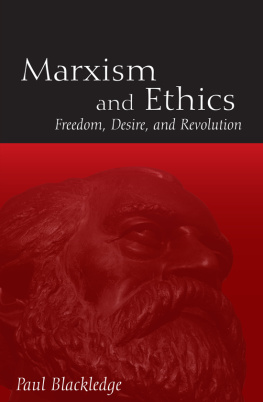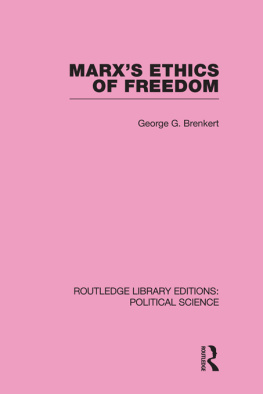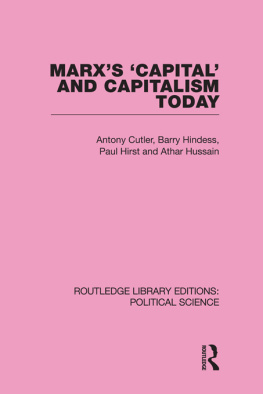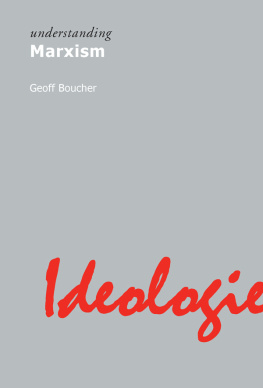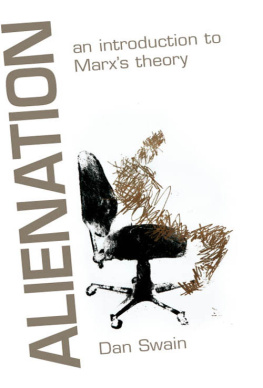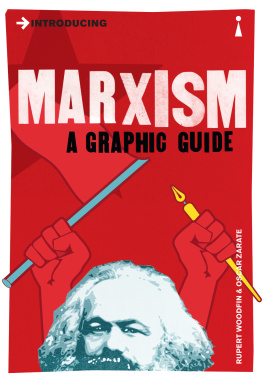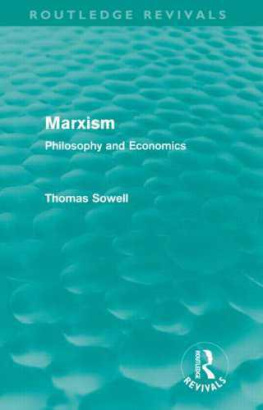SUNY series in Radical Social and Political Theory

Roger S. Gottlieb, editor
Marxism and Ethics
Freedom, Desire, and Revolution
PAUL BLACKLEDGE

Published by State University of New York Press, Albany
2012 State University of New York
All rights reserved
Printed in the United States of America
No part of this book may be used or reproduced in any manner whatsoever without written permission. No part of this book may be stored in a retrieval system or transmitted in any form or by any means including electronic, electrostatic, magnetic tape, mechanical, photocopying, recording, or otherwise without the prior permission in writing of the publisher.
For information, contact State University of New York Press, Albany, NY
www.sunypress.edu
Production by Eileen Meehan
Marketing by Michael Campochiaro
Library of Congress Cataloging-in-Publication Data
Blackledge, Paul, 1967
Marxism and ethics : freedom, desire, and revolution / Paul Blackledge.
p. cm.
Includes bibliographical references and index.
ISBN 978-1-4384-3991-4 (hardcover : alk. paper)
1. SocialismMoral and ethical aspects. I. Title.
HX45.B53 2012
171'.7dc22 2011010773
10 9 8 7 6 5 4 3 2 1
To Kristyn, with love
Acknowledgments
Some of the arguments presented below were first rehearsed in articles published in the journals Analyse and Kritik, Critique, History of Political Thought, International Socialism, Political Studies, Science and Society, Socialism and Democracy, and Studies in Marxism. Thanks to the editors and referees of these journals for forcing me to sharpen up my ideas. Thanks also to the numerous other people who have helped along the way. These include the various organizers of, and contributors to, conferences and seminars organized by Historical Materialism in both London and New York, the Political Studies Association, Manchester Metropolitan University's annual Workshops in Political Theory, the University of Glasgow Centre for Socialist Theory, Nanjing University's Institute for Marxist Studies, the Department of Philosophy at Flinders University Adelaide, the London Socialist Historians, and the SWP's annual Marxism conference. Thanks also to my colleagues in the School of Social Sciences at Leeds Metropolitan University. For more detailed criticisms I am indebted to Colin Barker, Ian Birchall, Joseph Choonara, Neil Davidson, Sam Farber, Rob Jackson, Kelvin Knight, Rick Kuhn, Jonathan Maunder, Peter McMylor, and Victor Wallis. Chris Harman's untimely death in 2009 robbed the international left of one its most important thinkers, and me of an inspirational mentor. The arguments presented in this book are much stronger for his searching comments on an earlier draft. At a more mundane level, my colleagues on the Branch Committee of UCU lecturers' union at Leeds Metropolitan University are a practical example of the virtues of solidarity defended in the pages that follow. My thanks to them. My sons Johnny and Matthew are now old enough to ask hard questions about my work. They do, and they are inspiring. My daughter Kate isn't old enough to do anything but inspire; she's a beautiful reminder of the better world we're fighting for. She was born and almost died while I was writing this book. The staff at Leeds General Infirmary, particularly those on the children's intensive care unit, reminded me what a wonderful institution the NHS continues to be, despite all the attacks that market-driven politicians continue to make on it. My heartfelt thanks to them. Most of all, though, this book could not have been written without the unstinting support of Kristyn Gorton. Kristyn, you are my rock, and this book is dedicated to you.
Introduction
Marxism's Ethical Deficit
We have found no way to replace capitalism as an effective mode of production, and yet that capitalist society as it actually functions violates all defensible conceptions of a rational moral order.
, 4
Marxism and Contemporary Political Philosophy
In a recent and very powerful critique of the social and political irrelevance of much of contemporary political theory, Raymond Geuss somewhat idiosyncratically suggests that if political philosophy wishes to be at all connected with a serious understanding of politics, and thus to become an effective source of orientation or a guide to action, it needs to return from the present reactionary forms of neo-Kantianism to something like the realist view, or, to put it slightly differently, to neo-Leninism (, 113).
This pseudo-objectivist cover for a nihilistic practice is often assumed to be an uncontroversial corollary of Marx's claim that the class struggle is characterised by an antinomy of right against right between which equal rights, force decides (, 8).
This assessment of the contemporary relevance and historical coherence of Marx's and Lenin's ethics and politics undoubtedly reflect the current academic consensus, even amongst the small minority of contemporary theorists who take the ideas of Marx and Lenin seriously (, believed that the only realistic contemporary political option for socialists from the Marxist tradition is to embrace what Marx would have dismissed as utopian socialism.
Interestingly, those contemporary theorists who, like Cohen, are influenced by Marx, but, unlike him, remain optimistic about the possibilities for radical change tend to share his unease with the scientific claims of classical Marxism. Thus Antonio Negri has suggested snatching Marxism back from its scientific status and restore it to its utopian, or rather ethical, possibility, while John Holloway has juxtaposed a more powerful tradition of workers' self-emancipation within Marxism to the pseudo-scientific attempts of Engels and Lenin to reduce it to a form of mechanical materialism (, Ch. 7).
In what follows I argue that this interpretation of the relation between science and ethics in Marx and Lenin is mistaken, and that, by contrast, Lenin shared with Marx a commitment to an ethics of freedom which points toward a compelling ethical critique of capitalism. Against the general drift of theory's return to ethics since the 1970s (, 64)Marx moved from formulating a model of human good to fighting for the political implications of this model. If this movement from ethics to politics was perhaps a little too quick both for many of Marx's academic interlocutors and for some of his political followers, the fact that Capital is best understood as an extended study of the potential for and limitations of human freedom suggest it would be a mistake to deny either the first ethical step of this movement or the unity of the movement as a whole.
I argue that classical Marxism, once adequately reconstructed and disentangled from its Stalinist caricature, provides the resources to underpin an ethical political practice that is able to move beyond the negativity of anti-capitalism toward a positive socialist alternative to capitalism. Far from being a form of class reductionism, Marx articulated and justified a conception of social subjectivity in which the struggle for freedom (real democracy) is not only the imperative of free agency but is also rooted in the new fangled working class's emergent desire to overcome alienation through the concrete forms of collective struggle and solidarity which characterize the highpoints of class struggle. In arguing this case, I position myself in opposition both to traditional right-wing critics of Marx and to the arguments made by his much more impressive critics on the left.

